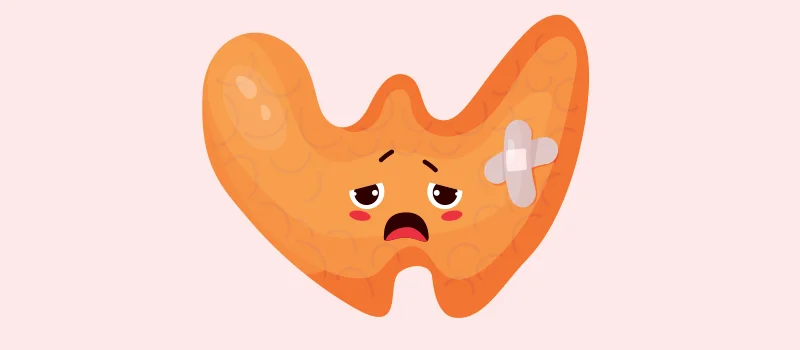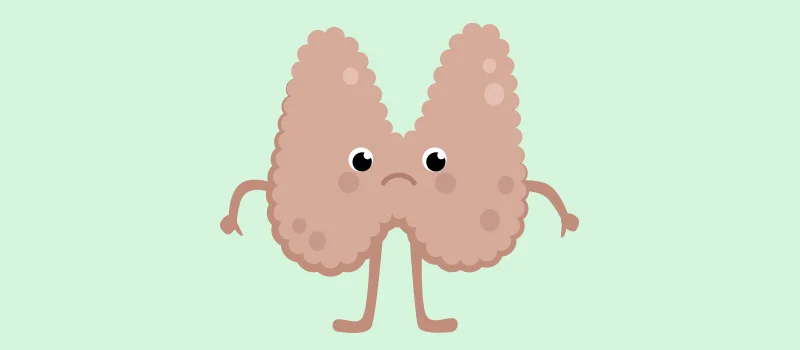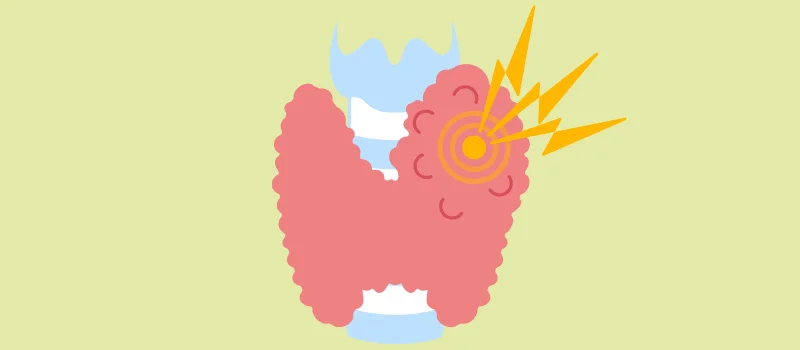Drug Details
Therapeutic Class:
Thyroid replacement (synthetic hormone L-triiodothyronine or T3)
Forms:
Tablet
Administration:
By mouth
Therapeutic Uses:
- Thyroid hormone replacement for hypothyroidism (underactive thyroid)
- Thyroid suppression therapy for goiter
- Thyroid stimulating hormone (TSH) suppression in well-differentiated thyroid cancer
- Thyroid suppression test for hyperthyroidism (overactive thyroid)
Controlled Status:
Not a controlled substance
Liothyronine Drug Class
Liothyronine (lye-oh-thy-roe-neen) is a thyroid agent. It is a synthetic form of triiodothyronine (T3).
Liothyronine Age Range
Liothyronine is approved for use in adults and children.
Uses
Liothyronine Uses
Thyroid hormone occurs naturally in the body. The action thyroid hormones exert on the body includes effects on growth and development, cardiovascular function, gastrointestinal function, reproductive function, cognitive function, mental health, bone metabolism, glucose metabolism, and lipid metabolism. Both low and high thyroid hormone levels can cause problems. Cytomel (liothyronine) is used to treat an underactive thyroid gland (hypothyroidism). It supplies thyroid hormone in people whose body does not naturally produce the hormone. This medicine is used for primary hypothyroidism (thyroid-based) as well as secondary (pituitary) or tertiary hypothyroidism (hypothalamus-based).
Liothyronine is also used to suppress thyroid function in people with goiter (an enlarged thyroid gland) and for pituitary thyroid stimulating hormone (TSH) suppression in people with well-differentiated thyroid cancer. This medicine is also used during a thyroid suppression test for hyperthyroidism.
There may be other uses of liothyronine—your health care professional or pharmacist can give you further drug information.
Liothyronine Mechanism of Action
Liothyronine is a synthetic form of the natural thyroid hormone triiodothyronine or T3. It is used as thyroid hormone replacement therapy in people who do not make enough of the hormone naturally.
Liothyronine Doses
Liothyronine is available as tablets in doses of 5 mcg, 25 mcg, and 50 mcg.
The dose of liothyronine depends on various factors such as your age, body weight, cardiovascular status, other medical conditions, including pregnancy, other medications, diet, and the condition being treated. Therefore, the dose of Cytomel (liothyronine) is individualized, and periodic dose adjustments are made based on your clinical response and laboratory results. The typical doses of liothyronine are as follows:
Adults with hypothyroidism: Healthcare providers usually initiate Cytomel therapy at 25 mcg orally once per day. This dose can be increased by 25 mcg daily every 1-2 weeks, if needed. The usual maintenance dose is 25 mcg to 75 mcg once daily. Doctors typically start with a lower dose of 5 mcg in elderly patients and patients with cardiac disease.
Pediatric patients: The usual dosage is 5 mcg once daily for initiating Cytomel therapy in infants. This can be increased by 5 mcg daily every 3-4 days, if needed. The usual maintenance dose for infants is 20 mcg once daily. The dose for 1-year-old children is 50 mcg once daily. Children above 3 years of age usually require the full adult dosage. Newborns who are at risk of cardiac failure and pediatric patients who are at risk of hyperactivity may be started on a lower dose.
Pregnant women: Pregnancy can affect thyroid hormone pharmacokinetics. An increase in the dose of this medicine is required for pregnant women with pre-existing hypothyroidism. The thyroid hormone dose is reduced to pre-pregnancy levels immediately after delivery.
For pituitary TSH suppression in well-differentiated thyroid cancer: The dose of suppressive Cytomel therapy is adjusted to achieve normal serum TSH levels (a target TSH level within a therapeutic range).
For thyroid suppression test: The recommended dose is one week of treatment with 75 mcg to 100 mcg daily. The uptake of radioactive iodine is measured before and after the 7 days of Cytomel (liothyronine) treatment. In people with normal thyroid function, radioiodine uptake falls significantly after treatment. A 50% or more drop in uptake indicates a normal thyroid-pituitary axis.
Switching from levothyroxine to liothyronine: Your doctor will tell you how to discontinue levothyroxine therapy and start liothyronine. The effects of levothyroxine can persist for several weeks, so they will start you on a low dose of liothyronine and gradually increase the dose based on your thyroid status. Your provider will monitor serum TSH periodically to evaluate your clinical and biochemical response to the medicine.
Directions
How To Use Liothyronine
Your doctor will ask you to administer Cytomel tablets orally (by mouth) once a day. Try to take your medicine at around the same time every day.
Read the prescription label carefully and take the medicine exactly as prescribed. Do not increase or reduce thyroid hormone dosage without consulting your healthcare provider. Your provider will likely start you on a lower dose and gradually increase the dose every 1-2 weeks until the desired response is achieved.
You will need to take liothyronine for life to control hypothyroidism symptoms. Continue taking liothyronine even if you feel well. Do not stop the medicine without talking to your healthcare provider.
Missed dose: If you forget a dose of liothyronine, take it as soon as you remember. However, if it is almost time for your next dose, skip the missed dose and take the next dose according to your regular dosing schedule. Do not take a double dose or extra medicine to make up for a missed dose.
Storage: Store liothyronine at room temperature (between 15-30° C or 59-86° F) away from moisture, heat, and direct light in its original container, tightly closed. Do not store medications in the bathroom, where they can be exposed to moisture and heat. Keep all medications safely out of reach of children and pets.
Unused medicine: Unused or expired liothyronine should be disposed of in a way that children, other people, and pets cannot get to them. Do not throw liothyronine in the trash or flush it down the toilet. The best way to properly discard expired or unneeded liothyronine is through your local waste disposal company or a drug take-back program. Learn more about proper medication disposal.
NOTE: This medication guide is a summary and may not contain all possible drug information on liothyronine. The information contained here may not be up-to-date. This sheet is for information purposes only. If you have questions about liothyronine, talk to your healthcare professional for medical advice.

Discounted prices for liothyronine
start at $26.80.
Get your FREE BuzzRx card and
start saving today!
Side Effects
Liothyronine Side Effects
Possible side effects of liothyronine are listed below. Tell your doctor if these side effects are severe or do not go away in a few days.
- Weight loss
- Excessive sweating
- Heat sensitivity
- Nervousness or anxiety
- Weakness
- Fatigue
- Temporary hair loss in the first few months of treatment (especially in children)
Less commonly, liothyronine can cause more serious side effects. Call your doctor immediately or seek emergency medical attention if you develop:
- Chest pain
- Fast or irregular heartbeat
The above list may not include all the possible side effects of liothyronine. Call your doctor for medical advice about side effects if they are unusual or severe, or if they do not get better over time. You can also report unusual side effects to the Food and Drug Administration at 1-800-FDA-1088.
Liothyronine Overdose: In case of an overdose, contact your doctor immediately. You can also call the National Poison Control Center at 1-800-222-1222. If a person cannot be awakened, has trouble breathing, has collapsed, or has had a seizure, call 911. Overdose symptoms may include sweating, headache, irritability, nervousness, increased bowel movements, and irregular menses.
Warnings
Liothyronine Risks, Warnings, and Complications
Liothyronine can cause serious health problems in some people. Talk to your doctor about other treatment options for hypothyroidism (underactive thyroid) if you are at an increased risk of serious adverse effects from this medicine. Some of the risks of taking liothyronine include:
|
Precautions Before Starting Liothyronine
Tell your doctor if you have ever had an allergic reaction to liothyronine, other thyroid medications such as levothyroxine, any of the active or inactive ingredients in Cytomel tablets, or any other medications. Your pharmacy can give you a list of ingredients.
Give your doctor and pharmacist a complete list of your medications, including prescription drugs, non-prescription medicines, vitamins, nutritional supplements, and herbal products. This can help avoid possible drug interactions between liothyronine and your other medications.
Give your doctor a complete medical history. Liothyronine may not be right for people with certain medical conditions such as adrenal insufficiency, thyrotoxicosis, diabetes, high blood pressure, or cardiovascular disease, including coronary artery disease, heart attack, angina (chest pain), or an irregular heart rhythm.
Tell your doctor if you are pregnant, could be pregnant, are planning a pregnancy, or are breastfeeding.
Precautions During Use of Liothyronine
Keep all your medical and lab appointments while on liothyronine. Your doctor may want to order certain medical tests and monitor you for adverse reactions.
If you are on cholesterol-lowering medications such as cholestyramine (Questran), colesevelam, or colestipol, a medication used to treat high potassium called Kayexalate, or a medication prescribed to dialysis patients called sevelamer, make sure you take these medications at least 4-5 hours away from your liothyronine dose.
Tell your healthcare professional if you become pregnant while on liothyronine.
Tell all your healthcare providers you are on liothyronine, including before any surgical procedures or dental treatments.
Liothyronine Drug Interactions
Interactions between liothyronine and other medications can affect how they work. Possible drug interactions can increase your risk of serious adverse reactions. Your doctor may change the dose of your medications and/or monitor you carefully for side effects if there are known interactions between liothyronine and your other medicines. The following medications can have interactions with thyroid hormone therapy:
- Oral anticoagulants or blood thinners such as warfarin (Coumadin, Jantoven)
- Insulin and oral medications used to treat diabetes
- Heart medications such as digoxin (Lanoxin)
- Estrogen-containing oral contraceptives
- Tricyclic antidepressants such as amitriptyline (Elavil)
Give your doctor or pharmacist a complete list of your medications, including prescription drugs, non-prescription medicines, dietary supplements, and herbal remedies. Also, tell your healthcare provider if you smoke, drink alcohol, or use recreational drugs because some of these substances can cause serious health complications when used with prescription medicines.
Pros & Cons
Liothyronine Pros and Cons
- You only need to take liothyronine once a day.
- Unlike levothyroxine, you don’t need to take liothyronine 30 minutes before breakfast.
- It is available in a lower-cost generic version.
- This medicine is safe for children, including infants.
- Liothyronine is not the first choice of therapy for hypothyroidism.
- This medicine has a narrow therapeutic index. You need frequent blood tests and dose adjustments to prevent overtreatment or undertreatment of your thyroid condition.
- This medicine has certain limitations of use. It is not for all thyroid disorders. For example, it is not used to suppress benign thyroid nodules or non-toxic diffuse goiter in iodine-sufficient people. It is also not used to treat hypothyroidism during recovery from subacute thyroid inflammation.
- Liothyronine may be more expensive than other thyroid supplements.
Pharmacist Tips
Liothyronine Tips from Pharmacists
Try to take liothyronine at the same time every day. This will help to maintain stable levels of thyroid hormones in your body.
Keep all your healthcare appointments while on Cytomel therapy. Your doctor will adjust our dose based on your response.
Tell your doctor right away if you notice symptoms such as a rapid or irregular heartbeat, irritability, nervousness, shakiness, trouble sleeping, fatigue, muscle weakness, excessive sweating, or frequent bowel movements. These can be symptoms of hyperthyroidism. Your liothyronine dose may be too high and may need to be reduced.
Rx Savings Tips
Liothyronine Rx Savings Tips
Liothyronine is a generic medication, and it is available at significantly lower prices than the brand name. Brand name Cytomel and generic liothyronine contain the same medicine and are equally effective and safe. Like with most medications, the generic version offers better value. A BuzzRx liothyronine coupon can result in big savings on the brand name and generic forms of the drug. With a BuzzRx discount card, savings card, or discount coupons, the medication could cost you a fraction of retail prices. Liothyronine may be under $27.00 for 90 tablets of the 5 mcg dose at Walmart, Walgreens, Rite Aid, CVS Pharmacy, and other participating pharmacies with a BuzzRx discount card or free coupon. For the biggest discounts on liothyronine, give the checkout clerk your BuzzRx liothyronine discount coupon when you drop off your prescriptions.
Lowest Price for Liothyronine | |
| Brand $38.77 | Generic $26.80 |
VIEW DISCOUNTS Pricing based on most commonly-filled versions. Select the strength and quantity of your medication for the most accurate pricing. | |
Common Questions
Common Questions about Liothyronine
Is liothyronine a T3 or T4?Liothyronine is a synthetic form of T3 (triiodothyronine). The synthetic form of T4 is available as levothyroxine sodium (brand name Synthroid). |
Does liothyronine cause weight loss?Liothyronine may cause weight loss as a side effect. However, this medication should never be used to treat obesity or control weight gain. It does not cause weight loss in people with normal thyroid function and can cause serious adverse effects at high doses. |
Can you take liothyronine and levothyroxine together?Your doctor may prescribe liothyronine and levothyroxine together for rapid treatment of severe or prolonged hypothyroidism. |
How long does it take for liothyronine to work?It can take several weeks for liothyronine to work before you notice an improvement in your hypothyroidism symptoms. Tell your doctor if your symptoms are not better after a few weeks of taking liothyronine regularly every day. Your doctor may increase the dose of your thyroid replacement therapy. |
What is the best time of day to take liothyronine?You can take liothyronine at any time of the day, morning or evening. Try to take your medicine at the same time every day. If liothyronine causes trouble sleeping, taking it in the morning instead of the evening might help. |
What is the price of liothyronine without insurance?Without insurance, liothyronine can be as high as $159.70, but with a free BuzzRx prescription discount coupon, you could pay as low as $26.80 for the most common version of this medication. Use the BuzzRx drug price look-up tool to find the lowest discounted price, and be sure to enter the correct dosage, form, and quantity for the most accurate pricing. While generics tend to have the best savings, you can also use your BuzzRx card and coupons to purchase brand-name versions. It never hurts to ask your pharmacist to try BuzzRx when filling or refilling any of your prescription drugs—whether you have insurance or not. |
What is the price of liothyronine with insurance?Ask your pharmacist or insurance provider for your copay price on liothyronine—Copay amounts vary depending on the type of insurance plan you have and if there is a deductible to reach before prescription drug coverage begins. You could save up to 80% on your prescription medication with a free BuzzRx discount coupon for liothyronine. When using the BuzzRx lookup tool to find the price of your medicine, be sure to enter the correct dosage, form, and quantity to receive the most accurate discounted pricing. It never hurts to ask your pharmacist to try BuzzRx when filling or refilling any of your prescriptions—whether you have insurance or not. |











SOCIAL